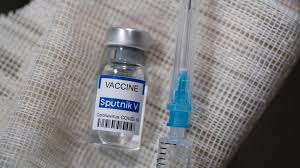The rapid spread of the Omicron, a highly contagious SARS-CoV-2 virus strain, has put the world in need of evaluating the effectiveness of existing vaccines, and new evidence suggests that Russian-made Sputnik V might be a possible solution.
The joint Russian-Italian study has found that the two-dose jab of Sputnik V provides two times higher virus-neutralizing antibodies against the fast-spreading Omicron strain than two doses of the Pfizer vaccine.
“The study was conducted in the equal laboratory conditions in the Spallanzani Institute in Italy on comparable sera samples from individuals vaccinated with Sputnik V and Pfizer with a similar level of IgG antibodies and virus-neutralizing activity (VNA) against Wuhan variant,” the Russian Direct Investment Fund (RDIF) and Gamaleya Research Institute of Epidemiology and Microbiology said in a statement issued on Thursday.
The study funded by the RDIF, which is responsible for marketing the vaccine abroad, demonstrates that Russia’s Sputnik V neutralizes the Omicron variant by inducing robust antibody response associated with high levels of protection.
“Among the top quartile of individuals with high RBD-specific IgG antibodies, 100% of those vaccinated with Sputnik V were able to neutralize Omicron variant in comparison to 83.3% of individuals vaccinated with Pfizer,” reads the statement. “Among all samples, 74.2% of Sputnik V-vaccinated sera were able to neutralize Omicron vs 56.9% for Pfizer-vaccinated.”
Developed by the Gamaleya Research Institute of Epidemiology and Microbiology, Sputnik V uses harmless viruses as a carrier to deliver a small fragment of the coronavirus to the body. The two-dose vaccine uses the unique technology of combining two different vectors based on human adenovirus and should be administered 21 days apart.
Sputnik V, also known as Gam-COVID-Vac, was Russia’s first vaccine to be registered for use. While the Sputnik V’s efficacy was confirmed at 91.4 percent based on data analysis of the final control point of clinical trials, the vaccine efficacy against severe coronavirus cases was said to be 100 percent.
Meanwhile, the two-dose Pfizer-BioNTech, a ribonucleic acid (RNA) vaccine developed jointly by the German biotechnology company BioNTech and Pfizer, an American company, demonstrated 95 percent efficacy against symptomatic SARS-CoV-2 infection and should be administered 21-28 days apart.
The prior studies also demonstrated that the Russian-made single-dose Sputnik Light Covid-19 vaccine can boost the effectiveness of the two-dose Sputnik V and other vaccines to strengthen and lengthen their protection against the Omicron variant of the novel coronavirus.
The emergence of the newly detected strain of Covid-19 named B.1.1.529 Omicron in southern Africa in November 2021 has caused alarm in the world because of its unprecedented series of genetic mutations.
Researchers worldwide are currently working to reveal more aspects of Omicron, which is believed to have outpaced the Delta variant in terms of transmissibility. The new strain reportedly carries about 50 mutations not seen in combination before, including those for the spike protein that the coronavirus uses to invade the cells. Scientists are concerned that such a wide variety of mutations can help Omicron evade immunity created by a vaccine.
The Omicron variant has so far been detected in 159 countries across all continents.







 Iran's senior military leaders described the drone and missile attack on Israel on April 14 night as “successful".
Iran's senior military leaders described the drone and missile attack on Israel on April 14 night as “successful".
 The number of evacuees from flooded areas in Kazakhstan has reached 97,852 people, including about 32,856 children since March 27.
The number of evacuees from flooded areas in Kazakhstan has reached 97,852 people, including about 32,856 children since March 27.
 Iranian President Ebrahim Raisi warned Israel that it would face a "real and extensive" response if it makes any "mistake" following Tehran’s missi...
Iranian President Ebrahim Raisi warned Israel that it would face a "real and extensive" response if it makes any "mistake" following Tehran’s missi...



